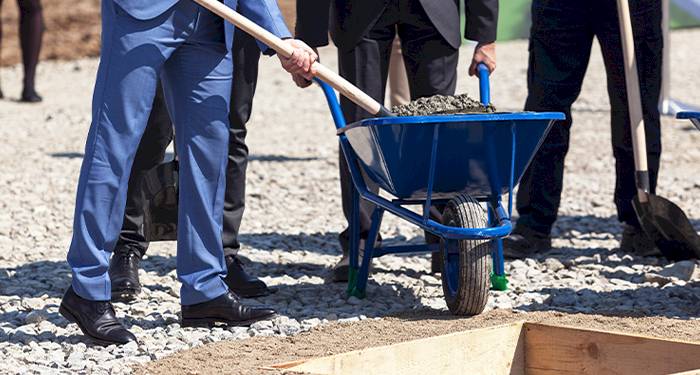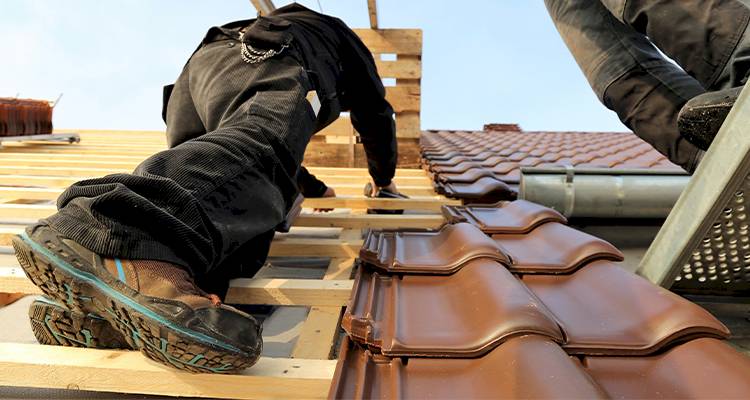How Much Does a Walk-in Bath Cost?
- The average cost to install a walk-in bath is £3,000.
- It will take about two to five days to complete.
- Detailed pricing for different types of walk-in baths and what impacts the cost.
- How long your walk-in bath installation is likely to take.
- How to find a local walk-in bath fitter using MyJobQuote.
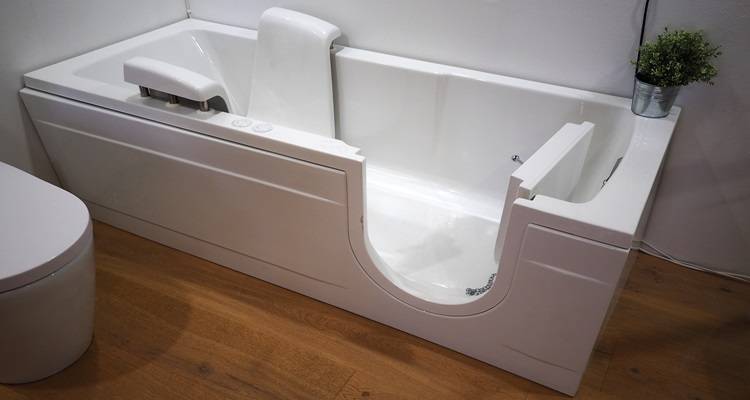
£3,000
Table of Contents
- How Much is a Walk-In Bath?
- Walk-In Bath Prices: Supply Only
- Walk-In Bath Fitting Costs & Timescales
- What's Involved in Installing a Walk-In Bath?
- Additional Walk-In Bath Installation Costs
- Factors That Impact Walk-In Bath Costs
- Types of Walk-In Baths
- Building Regulations and Walk-In Baths
- Alternative Types of Accessible Baths
- Checklist: Hiring Walk-In Bath Installers
- FAQs
How Much is a Walk-In Bath?
A walk-in bath is a unique bathtub that allows users to walk-in via a door before shutting the door to make it watertight, enabling the user to have a bath without the requirement of stepping into it over the edge.
This design makes it far more accessible to people with mobility issues, the elderly and those who may struggle to use a standard bathtub.
The cost of a walk-in bath will vary depending on a number of factors, which will be covered throughout this guide. But first, let's look at the typical cost of a walk-in bath.
The cheapest walk-in baths will typically cost between £2,700 and £3,000 including installation and labour fees.
Walk-In Bath Installation Costs
The table below shows how much different types and sizes of walk-in baths cost in the UK. These prices include materials and labour.
| Walk-In Bath Size and Type | Avg. Cost |
|---|---|
| 1060mm x 660mm Plastic Bath | £2,700 - £3,000 |
| 1700mm x 750mm Plastic Bath | £3,300 - £3,700 |
| 1675mm x 850mm Plastic Bath and Shower | £4,250 - £4,750 |
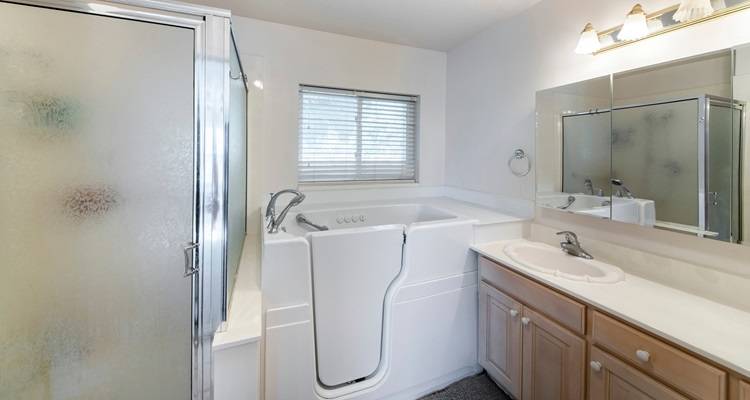
Walk-In Bath Extra Feature Prices
As well as differences in quality, brand, and material, due to the likely users of a walk-in bath, there is a wide range of additional features that can be installed with the walk-in bath.
For example, things like handrails and anti-slip flooring are usually essential, along with a multitude of seating options from motorised seats to manual lifting seats.
At the higher end of the price scale, a luxury walk-in bath, complete with chromotherapy lights, motorised seats, and safety equipment, could cost between £9,950 and £10,450 to purchase and have installed.
The table below shows how much some common extra features cost to install with a walk-in bath.
| Walk-In Bath Feature | Avg. Cost |
|---|---|
| Motorised Seat Addition | £1,550 - £1,750 |
| Chromotherapy Lights | £1,150 - £1,350 |
| Static Seat | £450 - £550 |
| Air Spa/Whirlpool | £2,750 - £3,050 |
Walk-In Bath Prices: Supply Only
The large bulk of the cost of installing a walk-in bath lies with the purchase of the bath itself.
As you can see from the table above, the more features that you opt for with your bath, the more expensive the bath will be. For example, a 1700mm x 750mm bath with chromotherapy lights and a motorised seat would cost, on average, around £4,600 without installation.
There are also additional supply costs to consider, as well as the features mentioned above.
Firstly, you will need to ensure that you have the bath itself, but each bath will have specific installation directions, meaning you will need to ensure the seals and fixtures match the bath that you are going to install. This can cost anywhere from £25 to £100.
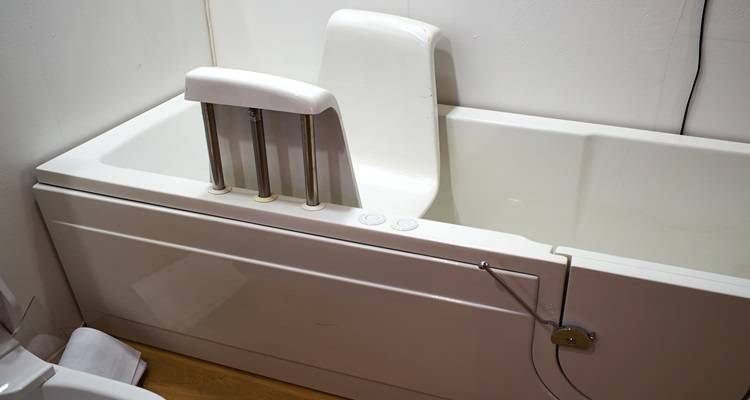
From here, consider which features are essential to you. For example, some people who suffer from arthritis and require a walk-in bath will also incorporate a massaging whirlpool feature into their bath.
While certainly not inexpensive, it can prove to be very beneficial over the long term for comfort and pain relief. If you struggle with mobility in your legs, it may be incredibly worthwhile to invest in a motorised seat to make getting in and out of the bath easier. With a walk-in bath, the benefits usually far outweigh the additional investment.
Walk-In Bath Fitting Costs & Timescales
Labour is costed based on time, and as such, the more complex the bath’s design, the longer it takes to install. Additionally, if there is any preparation work required before the bath can be installed, this will be factored into the overall labour quote.
You will need a bathroom fitter to install your bath, with the average cost for installation being around £1,000.
Bear in mind that a simple walk-in bath may only cost around £500, and more complex walk-in baths may be more like £1,500. Also, consider that extra features like motorised seats and chromotherapy lights will add time to the installation process.
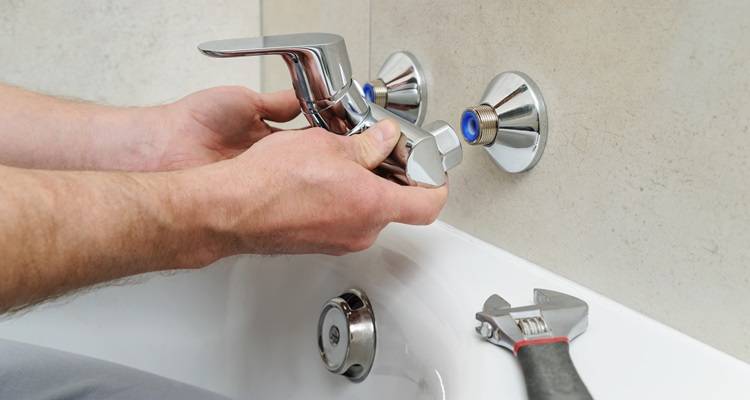
Most walk-in baths can be installed in 1-2 days.
This will usually consist of clearing the area for the bath, disposing of whatever was in place, and then refining the plumbing spaces for the installation of the new walk-in bath. From here, the bath will be fixed in place, and the plumbing connected up and tested fully for everything from watertightness to temperature controls.
However, if there are many additional features to install, this could take another 1-2 days. More complex, luxury walk-in baths will take more like 2-3 days to install, plus the additional time for added features.
What's Involved in Installing a Walk-In Bath?
While you could potentially fit a walk-in bath yourself if you were proficient at plumbing and electrics, most users choose to hire a specialist fitter for their walk-in bath installation.
It’s also a good idea to get several quotes from different fitters to find the best contractor for your project and budget.
MyJobQuote makes it easy to get fast, free, no-obligation quotes from local bathroom fitters and plumbers who specialise in walk-in bath installations.
Once you’ve found the right contractor for your project, here’s an overview of the process of getting a walk-in bath installed:
Before the Job Starts
- Home Survey and Measurements — Your contractor will measure your bathroom to agree the layout, make sure your walk-in bath fits, and assess access for carrying out the work.
- Plumbing and Electrics Check — They will check the plumbing and electrics to make sure they're all suitable and identify any updates or changes that need to be made.
- Quote and Options — Your fitter will provide you with a finalised quote for the cost of completing your walk-in bath project to the agreed specification.
- Preparation and Scheduling — Once you agree to go ahead, the materials will be ordered, and your fitter will schedule your installation and start planning your project.
During the Job
- Removal and Disposal — Your contractor will remove your old bath or shower and any old plumbing, the space is checked, and any issues addressed, before it is prepared for your new bath.
- Services Setup — The new water feeds and waste pipes are installed, and any necessary electrical work is completed by a qualified electrician.
- Fitting the Walk-In Bath — The new walk-in bath is installed, levelled, connected to the water feeds and waste pipes, and all the fittings and seals are installed to the correct specification.
- Sealing and Finishing — The area around the bath is made good and finished with any tiling and waterproof sealant, and any panels, trims, and accessories are fitted.
After the Job
- Testing and Handover — The fitter fills and empties the bath to make sure there are no leaks and the door works properly, before demonstrating the operation and safety features of your new walk-in bath.
- Certification — You will be provided with all the appropriate paperwork, including any necessary certificates and product or installation guarantees.
- Clean-Up — Finally, they will clear away any packaging and debris before making sure the area is clean and ready for use.
- Aftercare — You will be left with any instructions or guidance on the ongoing maintenance and care of your new bath, and what to do if you have any issues.
Additional Walk-In Bath Installation Costs
There may be some additional costs to consider outside of the supply and installation costs, primarily relating to preparing the bathroom for a walk-in bath.
Plumbing Upgrades
Your plumbing will need to be in good working condition to have a walk-in bath installed. There are also some upgrades that could make the walk-in bath easier to use and safer.
Here are some examples of plumbing improvements you may need or choose to have:
- Re-routing existing bath drainage system.
- Pipework repositioning.
- Improvements to drainage capacity.
- Installing rapid drain technology.
- Installing thermostatic mixing valve (TMV) for safety.
Your plumber will be able to advise whether any of these need to be added to your walk-in bath cost, but be aware that plumbing alterations can increase both material and labour costs.
Electrical Work
If you plan on incorporating things like chromotherapy lights or motorised seats into your walk-in bath, you must ensure that the electricity network within your house can cope with the additional demand and strain.
This could be anything from adding a few extra lights in strategic places to undertaking a complete rewire which costs around £4,000 on average.
Bathroom Extension
If your bathroom is not quite large enough for a walk-in bath, you may want to consider some alterations to your home.
This will drastically increase the overall cost of a walk-in bath, but if it is an investment for the long-term enjoyment of your home, it might be worth the outlay.
On average, the cost of building a bathroom extension is about £1,300 per square metre.
Aesthetic Improvements
You could also take the opportunity to make some visual improvements to your bathroom at the same time as installing a walk-in bath.
For example, the cost to tile a bathroom is around £750 or you could pay around £450 to install a new toilet.
Factors That Impact Walk-In Bath Costs
When purchasing and installing a walk-in bath, several cost factors come into play, from the initial price of the tub to installation and additional features. Here’s a breakdown of what to consider:
Basic vs Luxury Models
Basic Models:
Standard walk-in baths typically start around £1,200 to £4,000. These models usually include a simple door, seat, and grab bars.
Luxury Models:
For hydrotherapy jets, air jets, and quick-drain systems, prices can increase to £2,000–£4,000 or more.
Installation Complexity
Basic Installation:
The installation alone can range from £550 to £2,500, depending on factors like the complexity of the plumbing and the type of walk-in bath.
Structural Modifications:
If modifications to the bathroom are required (e.g., widening doors, adding reinforcement, or updating flooring), costs can increase significantly, sometimes adding £800 to £4,000.
Electrical Work:
Walk-in tubs with features like heated seats, air jets, or lights often require electrical wiring upgrades, which could add an additional £400 to £1,600.
Drain and Plumbing Adjustments
Rapid Drain Systems:
Adding a rapid drain system or upgrading plumbing for faster water flow may add £400 to £1,200.
New Plumbing Lines: Some homes may need new hot water lines or additional plumbing work if the bathroom is older, costing £400–£1,200 more.
Additional Features and Accessories
Therapy Features:
Add-ons like hydrotherapy jets, chromotherapy lights, aromatherapy, or heated surfaces can each add several hundred pounds to the base price.
Safety Features:
Anti-scald technology, grab bars, slip-resistant floors, and easy-to-reach controls may come at an additional cost but are often worth the investment for safety.
Quick-Fill Taps:
These can cost an extra £160 to £650 but can reduce wait times for filling the tub.
Types of Walk-In Baths
Soak Walk-In Bath Cost
Average cost: £2,000
These baths are basic walk-in baths that consist of a watertight door and are ideal for a relaxing soak without any additional features. Not only are they the cheapest models, but they are best for those who want a simple bath with easy access.
Pros
- ✔ Cheap
- ✔ Easy to Install
Cons
- ✖ No features
- ✖ Can look plain and boring
Hydrotherapy (Whirlpool) Walk-In Bath Cost
Average cost: £3,500
Hydrotherapy walk-in baths are equipped with strong jets to create a massaging effect for the user. This is primarily designed for muscle relief and circulation improvement, helping with ailments like arthritis and joint pain.
Pros
- ✔ Massaging effect
- ✔ Comfortable and relaxing
Cons
- ✖ More costly than others
- ✖ More complex installation
Air Jet Walk-In Bath Cost
Average cost: £3,500
Similar to hydrotherapy baths, air jet walk-in baths use soft air pressure to provide a much softer massage. This is ideal for those with ailments like fibromyalgia, as the firmer hydrotherapy baths may be too much for the condition.
Pros
- ✔ Massaging effect
- ✔ Comfortable and relaxing
Cons
- ✖ More costly than others
- ✖ More complex installation
Lay-Down Walk-In Bath Cost
Average cost: £2,500
These baths are longer, more like traditional baths, but still feature a walk-in door to allow the user to lie down. These are best for those who want the traditional experience without the access issues.
Pros
- ✔ Ability to lie down
- ✔ Look more traditional
Cons
- ✖ Take up more surface area
- ✖ Slightly more complex to install
Walk-In Shower/Bath Combos
Average cost: £3,000
These baths will not only feature a walk-in bath but also a shower for those who don’t always want to take a bath. Not only is it more efficient at times to shower, but you will also save water.
Pros
- ✔ Ability to take a bath or a shower
- ✔ Water savings
Cons
- ✖ Larger surface area
- ✖ More complex to install
- ✖ More expensive
Bariatric Baths
Average cost: £4,500
These baths are designed with a wider seat and a much more spacious interior to accommodate any larger users, whilst still providing a safe and comfortable experience.
Pros
- ✔ Larger space within the bath
- ✔ Accommodates more users
Cons
- ✖ Requires more surface area within the bathroom
Building Regulations and Walk-In Baths
There are no specific building regulations that apply to the installation of walk-in baths. However, there are several regulations to be aware of for working with the electrics within your home. Firstly, you must always use a registered and accredited installer for the installation of a walk-in bath.
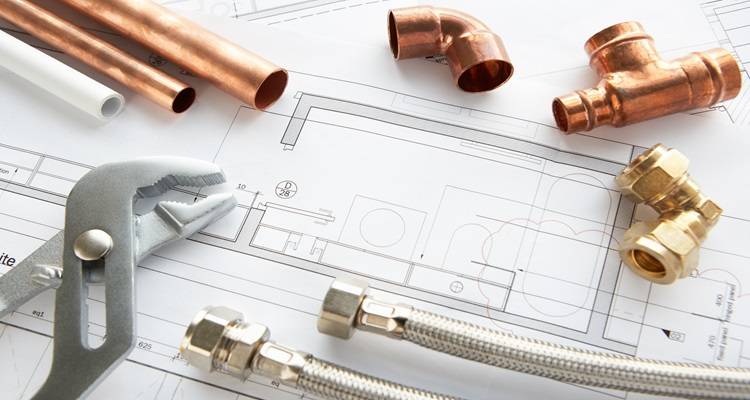
Next, you should ensure that for any elderly or vulnerable people, there is no impact on any existing safety equipment such as emergency lines and buzzers. Everything must remain working as it was pre-installation. You can ensure that all of this is in hand by employing an experienced and licensed contractor for your installation work.
Alternative Types of Accessible Baths
There are some alternatives to walk-in baths that may be more suitable for you personally.
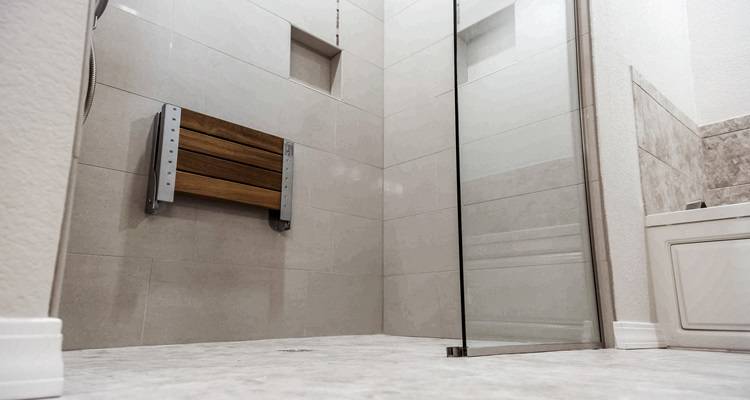
Walk-In Showers
Walk-in showers are much more common, and in fact, most homes will probably feature one anyway. Of course, for those with access or mobility issues, there are ways to make the walk-in shower much more convenient for the user.
For example, the installation of a shower seat can make this experience easier, as can handrails. These are fairly easily installed and obtained, and shouldn't be too costly either.
Bath Lifts
If you have a traditional bath and do not wish to change this to a walk-in bath, you can install a bath lift. Now, the price of a bath lift varies from around £200-£1,000 depending on the level of quality you opt for.
For example, a motorised bath lift may cost up to £1,000, while a simple semi-manual lift may cost as little as £250. There are many options across a range of different brands for you to choose from, and some even feature additional features like a reclining seat.
Wet Rooms
A slightly more extensive solution, a wet room will transform your entire bathroom into a large shower. This means that you can access it with ease, and the room will drain via one single drainage pipe in the centre of the room, with the floor sloped towards it to avoid pooling.
The key feature of this option is that you will have a lot of space for things like wheelchairs, chairs and any other mobility assistance equipment.
Checklist: Hiring Walk-In Bath Installers
Finding and hiring the right professional is essential for the success of any project, and this is most certainly true for finding a tradesperson to install your walk-in bath. Here are some top tips for selecting and hiring a skilled professional.
- Compare Quotes from Multiple Professionals. Don’t settle for the first price you’re given. Reach out to several professionals in your area for quotes, which helps you get a fair rate and gives you the chance to hear different ideas for the project. You may even find out some more information about walk-in baths, their features and the pros and cons of them.
- Check Reviews and Testimonials. The beauty of the modern age means that you can easily find reviews on platforms like Google or Checkatrade to see how others rate the professional you’re considering. Reviews often include examples of past work, giving you a clearer sense of what they will be able to provide for you.
- Ask for Recommendations. Personal referrals are invaluable. If you know someone who has recently completed a similar project, ask about their experience. Seeing a professional’s completed work firsthand is one of the best ways to assess their skill and reliability.
- Use Social Media for Insights. Sites like Facebook can be excellent for finding reputable professionals, as they often contain reviews from previous clients with verified profiles. These reviews can provide honest feedback and help reassure you that you’re choosing the right person for the job.
Taking these steps will increase your chances of hiring a reliable professional who’s a good fit for your project.





